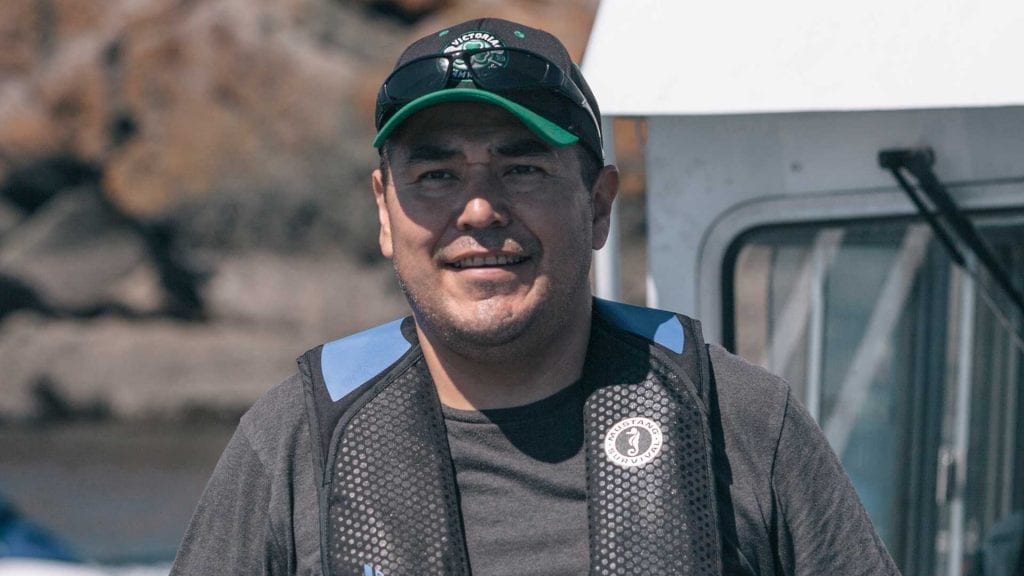
Chief Nicholas XEMŦOLTW̱ Claxton of the Tsawout First Nation says he's frustrated by Canada's approach to treaties.
Chief Nicholas XEMŦOLTW̱ Claxton of the Tsawout First Nation says that the challenges the Mi’kmaw Nation is facing “mirror” those of several west coast First Nations including his own.
“Our treaty too says that we’re entitled to carry on our fisheries as formerly, but that’s something that’s never been fully addressed in terms of how the government treats us, and I think that’s just a reflection of what’s going on over there in Mi’kmaw territory as well,” he says.
Claxton says he’s “frustrated” by the Canadian treaty violations he’s seeing in the Mi’kmaw territory.
Under the Peace and Friendship Treaties of 1752 and 1760-1761, the Mi’kmaw Nation, which has territory in much of the Atlantic, has a constitutional right to operate a moderate livelihood fishery.
In September, the Mi’kmaw Nation opened a lobster fishery in Nova Scotia, according to its treaty right to fish for a moderate livelihood. But they were met with racist pushback and non-Indigenous fishers have continued to harass, intimidate and threaten them.
On Oct. 21, the Mi’kmaq obtained an injunction that requires the RCMP the Mi’maq. However, prior to the injunction, RCMP and the federal governments were criticized for failing to protect Mi’kmaw harvesters from the violent attacks.

Treaty rights
The W̱SÁNEĆ Nation is made up of several first nations, whose territories extend over the San Juan and Gulf Islands, and the Saanich Peninsula. They signed the Douglas treaties near Fort Victoria in 1852. The Tsawout First Nation is located in Saanichton, B.C., and has 789 registered members.
On Sept. 30, Claxton and two other members of the W̱SÁNEĆ leadership council sent a letter to Prime Minister Justin Trudeau to demand action from the government to support the Mi’kmaq, including protection from infringement on their right to earn a moderate livelihood.
“The W̱SÁNEĆ Leadership Council fully supports the Sipekne’katik First Nation’s call for DFO Minister Bernadette Jordan, Nova Scotia Premier Stephen McNeil, and the RCMP to uphold the rule of law, stop the unlawful hinderance of its members in exercising their fishing rights, and prosecute any illegal protest or criminal behavior by the commercial fishing industry,” the letter says in part.
The Mi’kmaq, as a sovereign nation, self-regulate their fisheries, but can be moderated by the Canadian Department of Fisheries and Oceans (DFO) for conservation purposes.
Jane Deeks, the press secretary for the Minister of Fisheries, Oceans and the Canadian Coast Guard stated in an email that the government is currently reviewing fishery plans with First Nations in Nova Scotia.
“We know there is more work to do,” says Deeks. “We will continue to work with First Nations to ensure they can exercise their Treaty Rights.”
The right to fish, as they did pre-contact, was guaranteed to the W̱SÁNEĆ when they signed the Douglas Treaty of 1852. Like the Mi’kmaq, the W̱SÁNEĆ signed treaties before Canada was a country, as sovereign nations.
Claxton is frustrated that the federal government didn’t step in sooner, and that his own nation’s rights to fish as formerly haven’t been respected.
“Canada is doing nothing to help contribute, to pay back, to actually reconcile,” Claxton says. “They definitely don’t want to relinquish jurisdiction and control.”
Fishing and sovereignty
According to the W̱SÁNEĆ, their rights to fish have been infringed upon by Canada for years.
In the early 1900s, the traditional W̱SÁNEĆ reef net was banned by the Department of Indian Affairs because it was considered a “trap.”
Claxton did his Ph.D disertation on the revival of the traditional W̱SÁNEĆ fishery. He titled it “To Fish as Formerly,” after a quote from the Douglas treaties that guarantees them this right.
“For us, I think it meant that we were able to live the way we had always been for thousands and thousands of years, the way the creator intended for us to live,” he says.
For Claxton this is about more than just the right to fish or profit from the land, it’s about sovereignty and cultural survival.
“Our people need more land, we need more access to resources, we need to be able to govern ourselves. We need to have more just relationships with Canada and British Columbia, as nations not as oppressed citizens of Canada,” he says.
Revitalization of the reef net fishing practice and the transfer of knowledge from Elders to youth is one way how the W̱SÁNEĆ are reclaiming their culture and sovereignty explains Claxton.
“I think the future of our nation is within passing on this knowledge and sense of identity from, from Elders to us, rebuilding it that way. It’s going to be a long process but I think it’s necessary,” he says.
Members of the Tsawout First Nation held a solidarity blockade for the Mi’kmaq on the Pat Bay highway near Saanich, B.C. on Oct. 23.
They did so alongside two other nations in the broader W̱SÁNEĆ nation, Tsartlip and Tseycum.
“The same thing plays out here, [that plays out] there,” Claxton said, ahead of the demonstration.
“It’s really frustrating and that’s really the underlying thing that’s leading to the peaceful demonstration… [It’s] an expression of our frustration with the government and our solidarity with each other.










